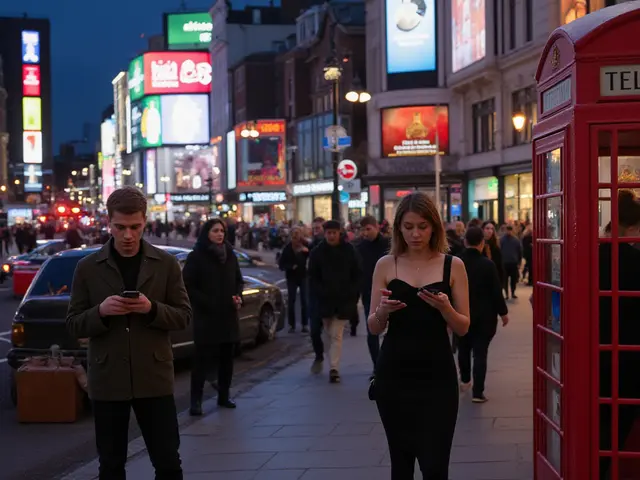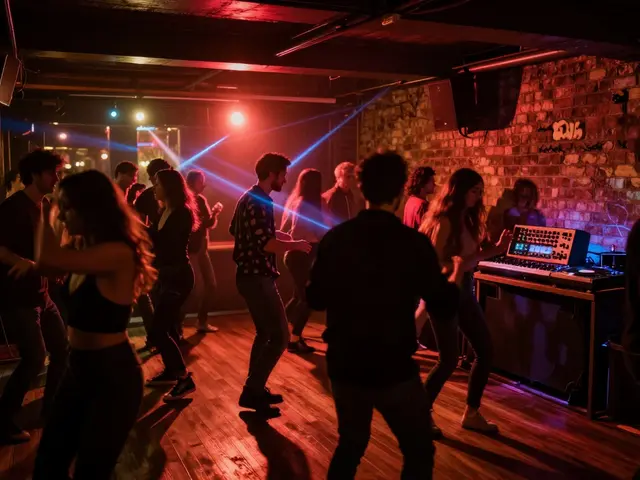Think Nobody Gets Arrested for Prostitution Anymore? Think Again. Just last month in Miami, cops rounded up 42 people in one night on prostitution-related charges. It’s 2025, but that doesn’t mean the risks have disappeared—or even shrunk. Turns out, laws around prostitution are anything but clear-cut, and depending on where you are, one misstep can land you in handcuffs faster than my cat Luna can swipe at a dust bunny. So before you swipe right or consider booking that "full-body massage,” it pays to know exactly what’s legal—and what could wreck your week.
The Legal Patchwork: Why Geography Changes Everything
If you’re expecting one simple answer about whether prostitution is legal or not, brace yourself for disappointment. The rules aren’t just different from country to country—they shift from state to state, city to city, sometimes even block to block. In the U.S., for instance, only select parts of Nevada allow legal brothels, and even there, street prostitution is off-limits. Meanwhile, places like Texas and Florida run major sting operations, and being caught in the wrong spa could mean jail time, a public record, and a ruined reputation.
Jump over to Europe, and you’ll see everything from open red-light districts in Amsterdam (where selling sex is legal but pimping isn’t) to Sweden’s approach, which criminalizes the buyer but not the seller. If you’re in Japan or Thailand, expect wildly different enforcement—Japan might tolerate certain establishments, while Thailand officially bans the trade but mostly turns a blind eye in tourist hotspots (until it doesn’t).
The numbers don’t lie. According to the United Nations Office on Drugs and Crime, over 40% of countries have some form of criminal penalty for prostitution, with penalties ranging from minor fines to multi-year prison sentences. Here’s something people constantly forget: even where selling sex is technically legal, related activities—like advertising, operating a brothel, soliciting in public, or living off someone else’s earnings—are often criminalized. That’s a legal minefield, especially for foreigners or digital nomads who think they’re safe just because they saw an HBO special that said otherwise.
| Country/State | Is Prostitution Legal? | Risks | Penalty |
|---|---|---|---|
| Nevada (Certain Counties) | Yes (licensed brothels only) | Illegal outside brothels | Fines, jail |
| Sweden | Legal to sell, illegal to buy | Buyers frequently prosecuted | Fines, public record |
| Thailand | Illegal (but widespread) | Enforcement is unpredictable | Fines, deportation |
| United Kingdom | Legal to sell, illegal to advertise or solicit | Police stings; public shaming | Fines, criminal record |
No matter where you go, thinking you’re immune to the rules just because “everybody does it” is a fast way to get burned. Laws change all the time, especially after elections or high-profile scandals. Always check the latest regulations online or with local legal aid.
What Counts as Prostitution? Definitions Matter More Than You Think
This might surprise you: what the law calls “prostitution” varies a lot. In some places, any exchange of money for sexual services is illegal, whether it’s negotiated on a sidewalk or through a discreet app. Other places draw the line based on where it happens (a street corner, a massage parlor, your own apartment), or who’s involved (professional providers, amateurs, buyers, or third parties).
Take Los Angeles, for example. Anything that suggests a commercial exchange for sex can get you charged, even if no actual sex takes place—just the offer is enough. In many European cities, the conversation itself could be a crime if it happens in public, even if nobody follows through. And don’t think you’re safe behind closed doors: undercover police stings often begin with a conversation or text that mentions money.
There’s also the gray area of “escort services.” Is hiring an escort legal? Maybe. But if money changes hands for anything sexual, the law likely sees it as prostitution. In Singapore, they even criminalize “any indecent act” for payment, so vague language won’t save you.
Some areas have started using online evidence—texts, DMs, emails, even money transfers—during prosecutions. That means digital footprints, not just face-to-face bargaining, can put you at risk.
- Public vs. private: Street solicitation is usually targeted more aggressively by law enforcement than private, out-of-sight encounters. But both can be illegal.
- Direct vs. indirect: If you pay for “companionship” and something more happens, police may see that as enough. Some states include “lewd acts” or “conduct in exchange for compensation.”
- Third parties: Pimps, drivers, website owners, or even roommates who know and profit can catch charges if cops decide they’re facilitating for gain.
Clarity matters. If you think you’ve found a loophole by calling it “companionship,” know that over 70% of charges in major U.S. cities are based on circumstantial evidence, not direct admission.

Real Life Consequences: More Than Just a Slap on the Wrist
Risking a quick thrill? Be prepared for damage that lasts. Even a first offense can mean more than a small fine. Public embarrassment, permanent criminal records, and lost jobs are all common outcomes. I know a guy in Phoenix who lost his teaching job over a misdemeanor solicitation conviction—thanks to local papers running his mugshot online. That sort of thing doesn’t just blow over in a week.
Here’s a wild stat: a 2024 review in The Journal of Criminal Law & Criminology found that 63% of arrests for prostitution in U.S. cities end up published on searchable online logs—think Google results that last longer than your last New Year’s resolution. Plus, those logs are permanent. Several states require registration as a sex offender for repeat offenses, especially when minors are involved—even if it’s an honest mistake and the person lied about their age.
If you’re not a U.S. citizen, the stakes leap even higher. Immigration authorities often treat prostitution-related convictions as grounds for visa denial or deportation, even if it’s just a misdemeanor. Embassies in Dubai and Singapore regularly warn travelers about this risk, and reported deportations shot up 18% last year among North Americans in Southeast Asia.
Think about your digital footprint, too. Once your name’s tied to a bust—whether as a buyer or a seller—it can follow you around, tanking job searches and dating prospects for years. That’s not counting court dates, steep legal fees, and mandatory courses that nobody enjoys (except maybe the people charging $200 a session for "rehabilitation").
- First offenders often get heavy fines—$1,000 or more isn’t rare.
- Court-ordered community service is getting popular in larger cities as a punishment—but you must show up or get hit with jail time.
- Repeat offenses mean escalating penalties: higher fines, possible jail, and mandatory registration. In South Carolina, third convictions mean years behind bars.
- If you’re a business owner, being linked (even unknowingly) to illegal adult services via property leases or web ads can cause licensing headaches and reputational death drops.
So, that embarrassment you think you’ll shrug off? It lingers—a lot longer than a wild night.
How to Avoid Legal Risks: Smart Tips for Staying Out of Trouble
Knowledge really is power—and sometimes it’s your best defense. First, research the prostitution laws wherever you’re traveling or working. Don’t trust hearsay or rumors—laws update fast, especially after scandals or political shifts. A quick search for "local criminal code prostitution” plus the city or country usually gets you the real info.
Keep your interactions vague and stick to legal activities. Don't discuss prices for services that even hint at sex in public or online. Apps, texts, and DMs are routinely subpoenaed, and in sting operations, cops are often looking for clear language or specific code words.
If you’re booking an escort or a massage, use reputable platforms where adult services are clearly differentiated—and check user reviews. Most established agencies have strict policies about what is and isn't offered, and they usually stay far from illegal territory to protect themselves and clients. Shady websites with no track record or anonymous ads are high-risk.
- Only meet in safe, public places if it's your first interaction. Producers of stings often look for buyers who are quick to suggest hotels or private homes.
- If something feels off, trust your gut. The fear of missing out is not worth risking your job or freedom.
- Be cautious about bringing large amounts of cash. Some places have laws allowing police to seize money if they suspect it's for illegal activity—yes, really, and getting it back is no joke.
- Double check the age and ID of anyone you meet, even if they seem way over 18. Age misrepresentation online is a known problem, and law enforcement doesn’t care if “she looked 22.”
- If you are ever approached by law enforcement, ask if you’re being detained or are free to go. Don't admit anything or sign documents without a lawyer present.
I have friends who carry a printout of local laws as a backup—a little nerdy, but smart. Legal forums like Reddit and Tripadvisor sometimes offer up-to-date tips from locals, but always verify with an official site afterward.
Staying safe isn’t only about dodging the police—it’s about protecting your privacy and your future, too.

What’s Next? How the Law Could Change in the Years Ahead
If the last ten years have taught us anything, it’s that sex work laws are in constant flux. More states and countries are piloting new models: some are moving toward full decriminalization (like New Zealand), while others crack down even harder, hoping to curb human trafficking. Tech companies are also changing the game—platforms like OnlyFans and specialized adult sites have drawn more government attention than ever before. You can expect new bills and surprise police operations when elections roll around or after public scandals.
The data shows a shift, too. According to the International Committee on the Rights of Sex Workers in Europe, over 30% of European countries are reevaluating their prostitution laws for 2025. Legalization supporters argue that regulated markets actually reduce violence and disease rates—a famous 2022 Amsterdam study found violence and STIs dropped 22% after new protections rolled out.
But there’s plenty of pushback. Community groups in big U.S. cities regularly push for stricter enforcement, and after a 2024 incident in Las Vegas, several counties made it harder (not easier) to open new legal brothels. Meanwhile, the rise of digital sex work means authorities have to constantly adjust—web-based evidence, crypto payments, and online ads aren’t just the future; they’re here now.
If you’re living in—or just visiting—a place known for its adult scene, don’t assume the rules will stay the same forever. Keep an eye out for ballot questions, local government meetings, or sudden raids. Even law enforcement sometimes finds itself confused by new rules, which leads to uneven enforcement and surprising prosecutions.
The world is getting more complicated, not less. The safest play? Stay informed, don’t cut corners, and when in doubt, walk away. There’s no thrill worth risking your record, your reputation—or that smug look Luna gives me when I get caught up in a mess that could have been avoided.







